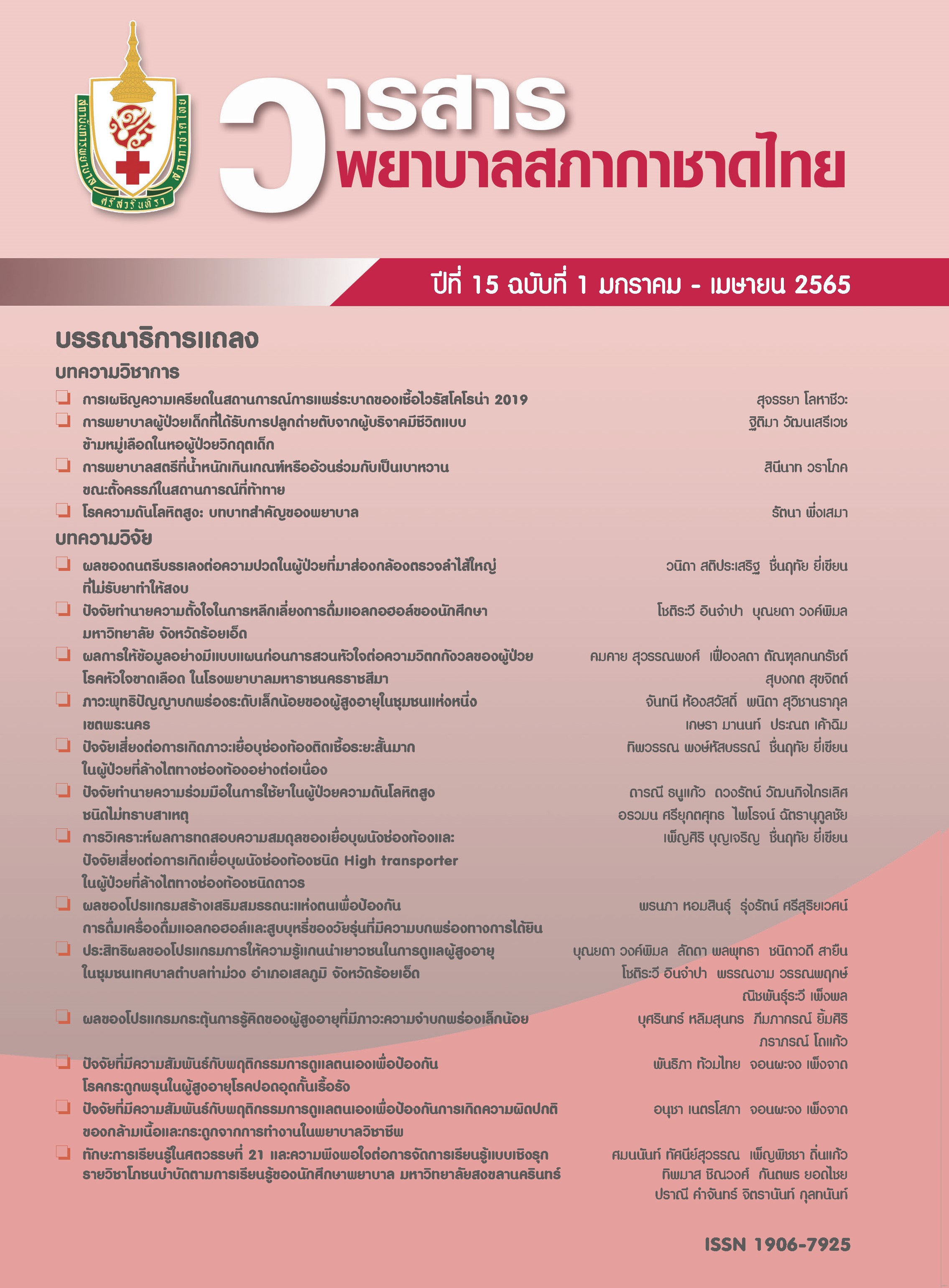Effect of a Cognitive Stimulating Program for Elderly People with Mild Cognitive Impairment
Keywords:
Cognitive Stimulating Program, elderly people, mild cognitive impairmentAbstract
This quasi-experimental research aimed to investigate the effects of a Cognitive Stimulating Program on 30 elderly persons with mild cognitive impairment. The 30 subjects qualified for six sessions of the cognitive stimulating program. Each session was performed within two hours. There was a two-week duration between each session. The data collection instruments were: 1) a General demographic questionnaire; 2) a 2-question depression questionnaire; 3) the Thai Geriatric Depression Scale (15 items); 4) the Barthel Activities of Daily Living; 5) the Mini-Mental State Examination (Thai version, 2002); and 6) the Montreal Cognitive Assessment. The research instruments No.3 - 6’s Inter-rater reliability coefficient were 0.55, 0.77, 0.69 and 0.71, respectively. Data were analyzed using descriptive statistics and paired t-test.
The results showed that the mean cognitive function scores among elderly people after participating in the program (Mean = 24.28, SD = 2.95) were higher than the mean cognitive function scores before participating (Mean = 19.97, SD = 3.21), statistically significant (t = 8.64, p < .001) and the mean cognitive function scores on Complex attention, Language, and Memory after participating in the program were significantly higher than the mean cognitive function scores before participating (t = 4.00, p < .001), (t = 4.61, p < .001), (t = 6.79, p < .001), respectively.
The Cognitive Stimulating Program for elderly people with mild cognitive impairment should be implemented to promote cognitive function and reduce the risk of dementia in the future.
References
Muangpaisan W. Dementia: prevention, assessment and care. Bangkok: Faculty of Medicine Siriraj Hospital, Mahidaol University; 2013. (in Thai).
Undara W, Singhasenee U, Wongnitikul P. The study of dementia, knowledge and prevention of dementia and the demographic data in the elderly association of Royal Thai Air Force Nursing College. JOPN 2016;8(1):23-33. (in Thai).
American Psychiatric Association. Diagnostic and statistical manual disorders: DSM-5. 5thed Washington: American Psychiatric Publisher; 2013.
Kaduszhiewicz H, Eisele M, Wiese B, Prokein J, Luppa M, Luck T, et al. Prognosis of mild cognitive impairment in general practice: result of the German Age CoDE study. Ann Fam Med 2014;12:158–65.
Subindee S, Sritanyarat W. Mild cognitive impairment in older persons with chronic illness attended at a chronic care clinic of a primary care unit Khon Kaen province. Journal of Nursing Science & Health 2014;37(1):43-50. (in Thai).
Praison P, Chuajedton P. Factors related to mild cognitive impairments in elderly people in Chiang Rai Province. Thai Journal of Nursing Council 2017;32(1):64-80. (in Thai).
Social Development Office and Human Security, Prachuap Khiri Khan Province. Report of social situation, Prachuap Khiri Khan Province 2020. Prachuap Khiri Khan: Social Development Office and Human Security; 2020.
Spector A, Thorgrimsen L, Woods B, Royan L, Davies S, Butterworth M, Orrel M. Efficacy of an evidence-based cognitive stimulation therapy programme for people with dementia: randomised controlled trial. Br J Psychiatry 2003;183:248-54.
Aguirre E, Spector A, Orrell M. Guideline for adapting cognitive stimulation therapy to other cultures. Clin Interv Aging 2014;9:1003-7.
Aguirre E, Woods RT, Spector A, Orrell M. Cognitive stimulation for dementia: a systematic review of the evidence of effectiveness from randomised controlled trials. Ageing Res Rev 2013;12(1):253-62.
Suwanmosi P, Kaspichayawattana J. The effects of cognitive stimulation program on memory of community-dwelling older persons with mild cognitive impairment. JOPN 2016;8(2):45-57. (in Thai).
Jeeraya S, Hengudomsub P. Vatanasin D, Pratoomsri W. Effects of cognitive stimulation program on perceived memory self-efficacy among older adults with mild cognitive impairment. The Journal of Faculty of Nursing Burapha University 2018;26(2):30-9. (in Thai).
Ramking N, Soonthornchaiya R, Vuthiarpa S. The effects of cognitive stimulation program on the cognitive function of older adults with mild cognitive impairment. Journal of Nursing and Health Care 2018;36(2):114-22. (in Thai).
Kwok T, Wong A, Chan G, Shiu YY, Lam K, Young D, et al. Effectiveness of cognitive training for Chinese elderly in Hong Kong. Clin Interv Aging 2013;8:213-9.
Kroenke K, Spitzer RL, Williams JB. The Patient Health Questionnaire-2: validity of a two-item depression screener. Med Care 2003;41(11):1284-92
Lee S, Dajpratham P. Criterion validity of the Thai version of the PHQ-9 and the PHQ-2 for screening major depression in Thai elderly. J Thai Rehabil Med 2017;27(1):30-7. (in Thai).
Wongpakaran N, Wongpakaran T, Van Reekum R. The use of GDS-15 in detecting MDD: a comparison between residents in a Thai long-term care home and geriatric outpatients. J Clin Med Res 2013:5(2):101-11.
Institute of Geriatric Medicine, Ministry of Health. A guide to healthy older screening for community health volunteer. Nonthaburi: Institute of Geriatric Medicine; 1999.
Institute of Geriatric Medicine. Cognitive function tests Thai Version: MMSE-Thai 2002. Nonthaburi: Institute of Geriatric Medicine; 2001.
Tangwongchai S, Charernboon T, Phanasathit M, Akkayagorn L, Hemrungrojn S, Phanthumchinda K, et al. The validity of Thai version of the montreal cognitive assessment (MoCA-T). Dement Neuropsychol [Internet]. 2009 [cited 2018 Oct 10];3(2):173. Available from: https://www.researchgate.net/publication/311715441_The_validity_of_thai_version_of_the_montreal_cognitive_assessment_MoCA-T
Downloads
Published
Issue
Section
License
Copyright (c) 2022 Srisavarindhira Thai Red Cross Institute of Nursing

This work is licensed under a Creative Commons Attribution-NonCommercial-NoDerivatives 4.0 International License.
เนื้อหาบทความหรือข้อคิดเห็นต่างๆ ในวารสารพยาบาลสภากาชาดไทยนี้ เป็นความคิดเห็นของผู้เขียนบทความ ไม่ใช่ความเห็นของกองบรรณาธิการ หรือสถาบันการพยาบาลศรีสวรินทิรา สภากาชาดไทย






